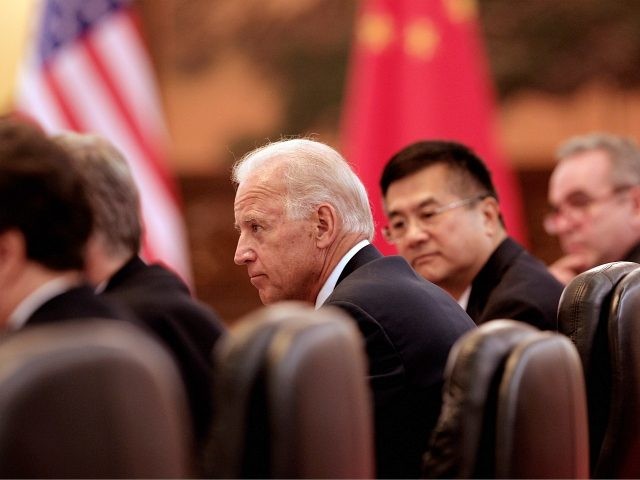The L.A. Times on Thursday documented how Hollywood studios owe former vice president and 2020 presidential candidate Joe Biden a few billion favors because he played a pivotal role in helping them gain access to the lucrative box office in China.
“Several of the candidates vying for the Democratic presidential nomination have significant support in Hollywood — [Jeffrey] Katzenberg, for example, has kicked in $2,800 each to 14 of them already — but none has as long a history of delivering for the industry as Biden,” the L.A. Times observed.
These deliverables for Hollywood were largely made possible by Biden’s eight years as vice president, during which time he was able to put Hollywood heavyweights in the room with top Chinese officials — as was the case with Katzenberg allegedly meeting Chinese Communist Party chief Xi Jinping in 2012 and sealing the deal for the $330 million Oriental DreamWorks studio.
Biden was a tireless advocate for Hollywood issues in general during his vice presidential tenure, prominently including the legislative battle over online piracy, which was also a factor in the entertainment industry’s support for the Trans-Pacific Partnership.
Naturally, everyone involved in the relationship Biden helped to foster between Hollywood and China insisted there was absolutely nothing improper or unwise about any of it. Oriental Dreamworks is now fully owned by Chinese companies and has been renamed “Pearl Studio,” but it still collaborates with DreamWorks and Universal. The most notable product of Oriental Dreamworks during its years of joint ownership was the Kung Fu Panda film franchise.
Biden’s Democrat rivals are unlikely to hit him from the left for being cozy with China or fret about the Chinese Communist Party’s growing influence in Tinseltown, since that could bring them uncomfortably close to President Donald Trump’s position in the trade war, or smack of xenophobia to Democrat primary voters.
The Times anticipated, however, that left-wing populists might give Biden some grief for having so many super-rich donors, and the Democrat Party remains divided on the Trans-Pacific Partnership ever since the 2016 presidential campaign.
Biden infamously scoffed at the notion of China being a threat to the United States early in his 2020 presidential campaign but quickly reversed course. Questions have been raised about the Biden family’s financial relationship with Chinese interests, but everyone involved in the first 2020 Democratic presidential debate made a point of not asking them.
The market access Biden won for Hollywood in China has been losing some of its value as tight-fisted censorship from Xi Jinping’s authoritarian government pushes box office receipts down and crushes high-profile Chinese film projects deemed politically unacceptable. Chinese blacklists of American entertainers have begun and the feeling in Hollywood is that the situation could get much worse.
The relationship is still profitable enough for Hollywood studio executives and producers to express deep unhappiness with the U.S.-China trade war, as movie moguls openly admit their business models are now deeply dependent upon revenue from the Chinese market.
The result is an outsized Chinese Communist influence on American film productions, which avoid any content that might get them banned from the Chinese box office and are increasingly likely to partner with Chinese studios on major productions to ensure smooth sailing into Chinese theaters.

COMMENTS
Please let us know if you're having issues with commenting.